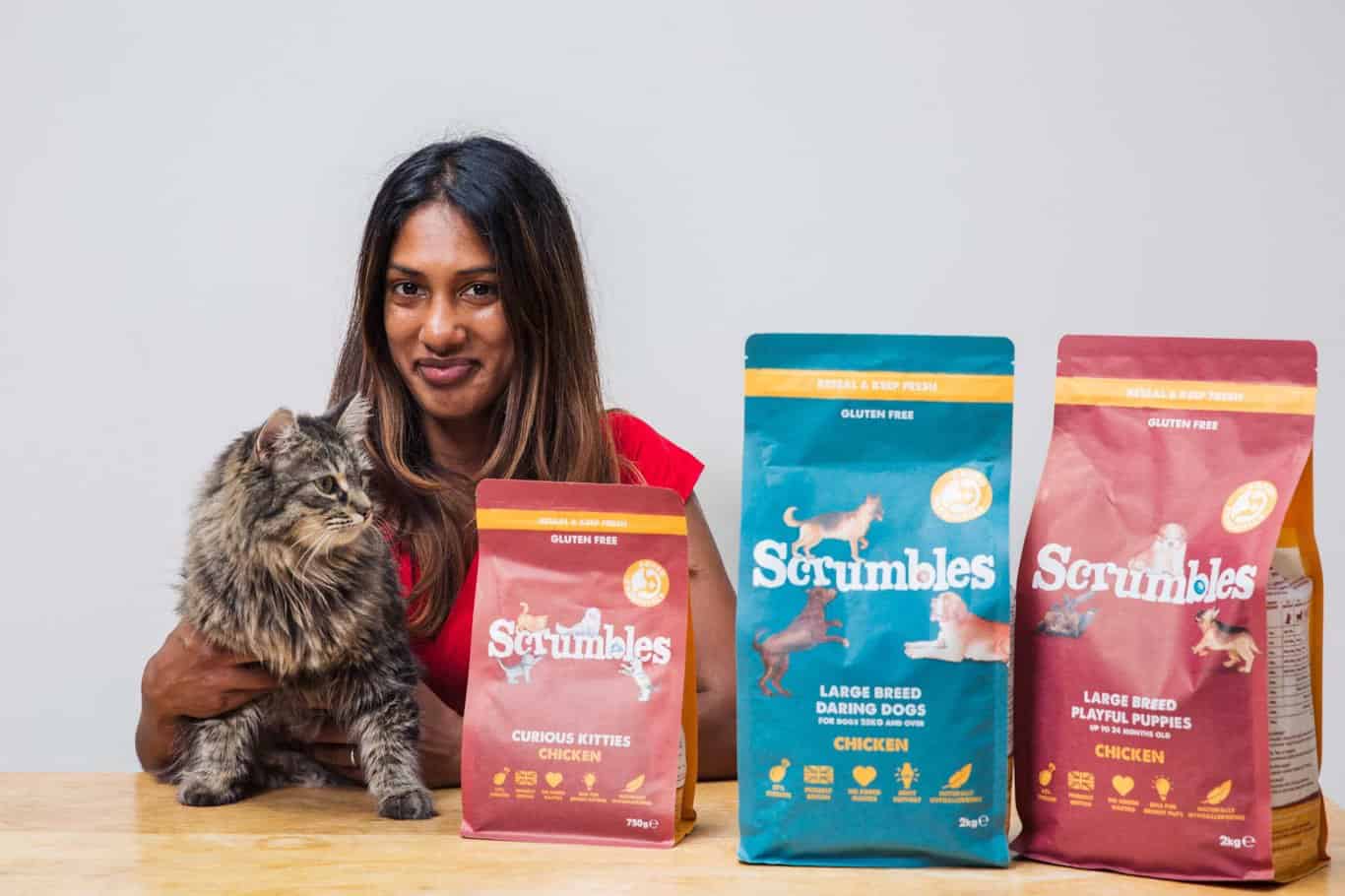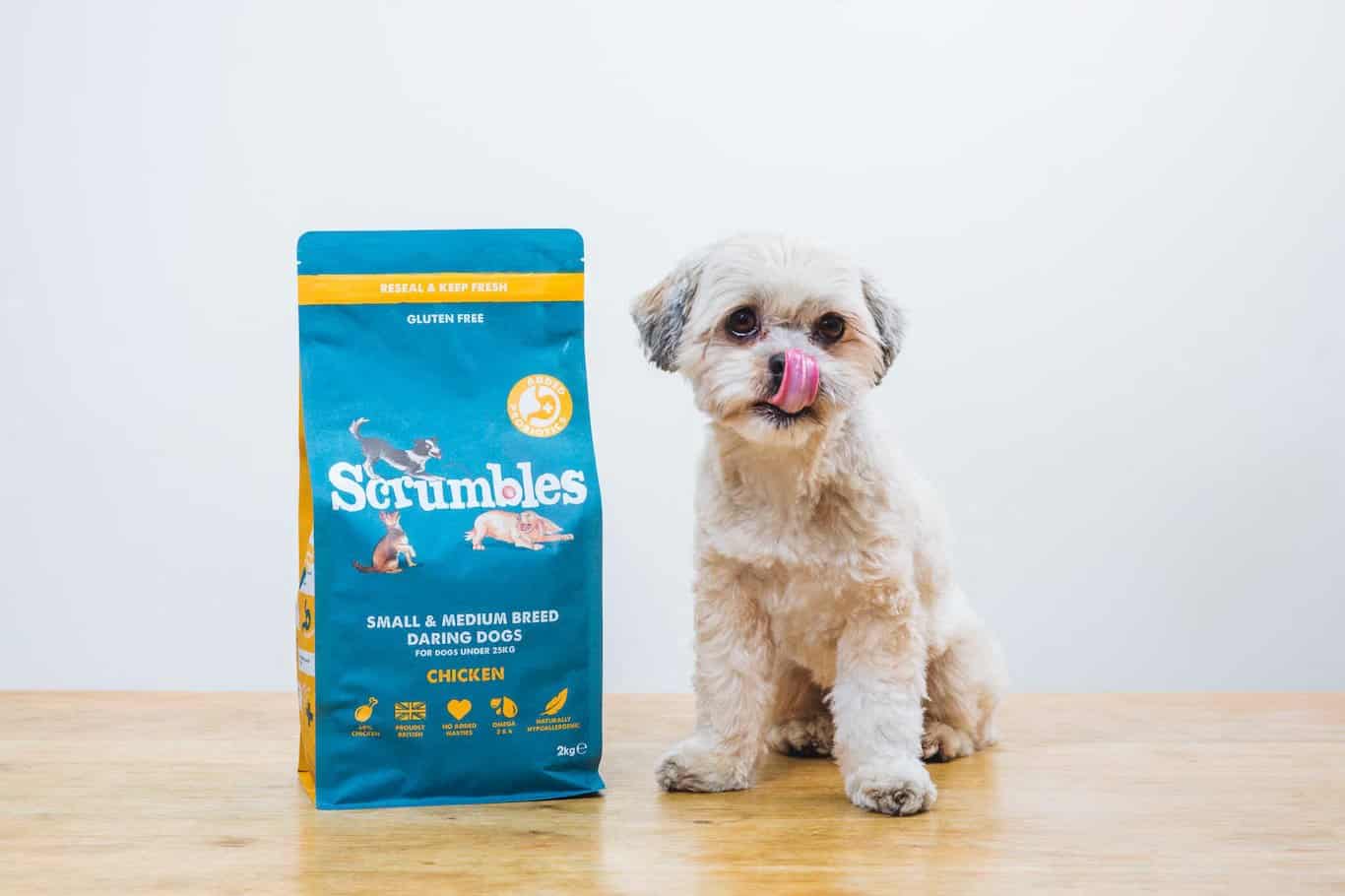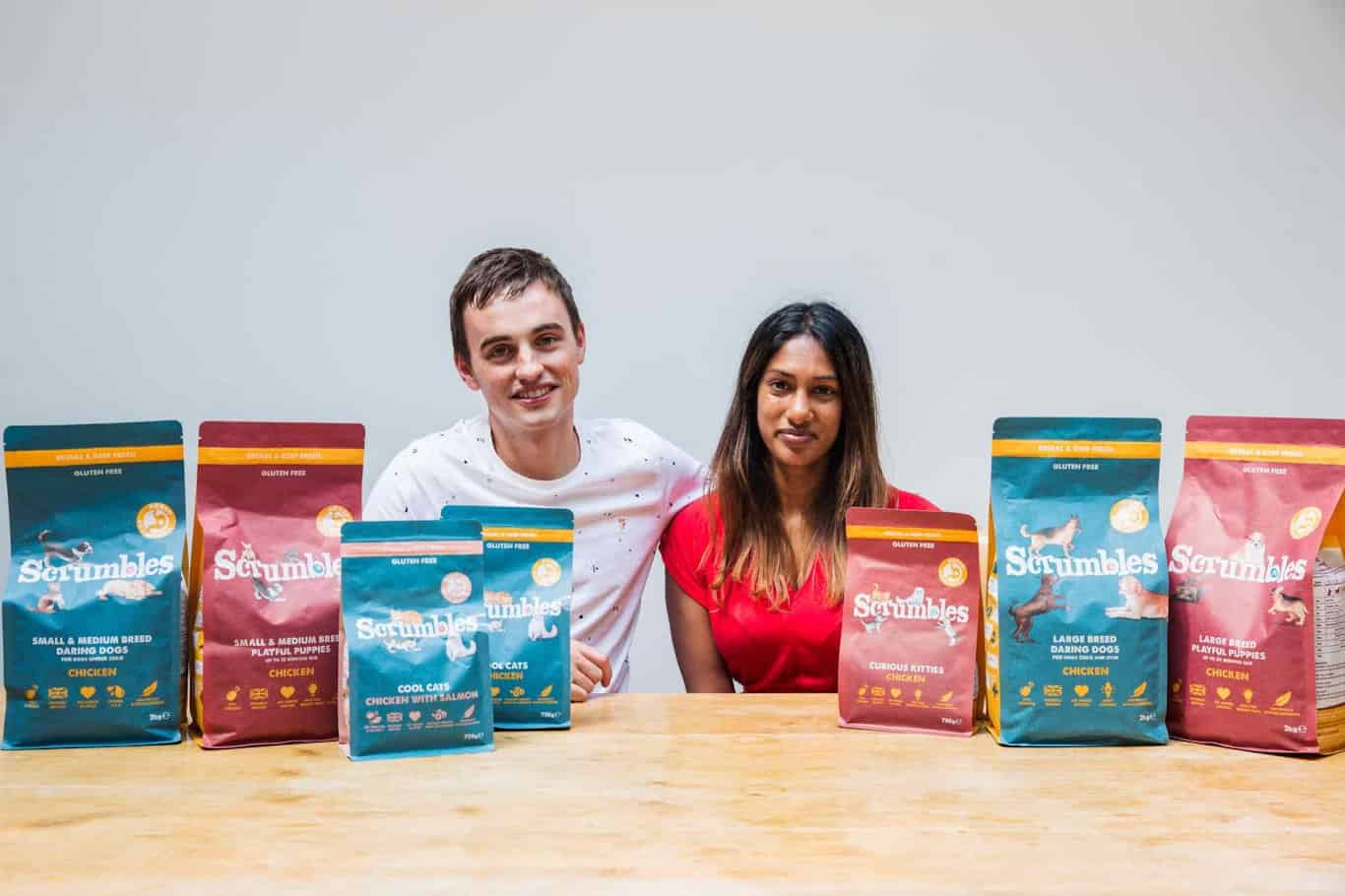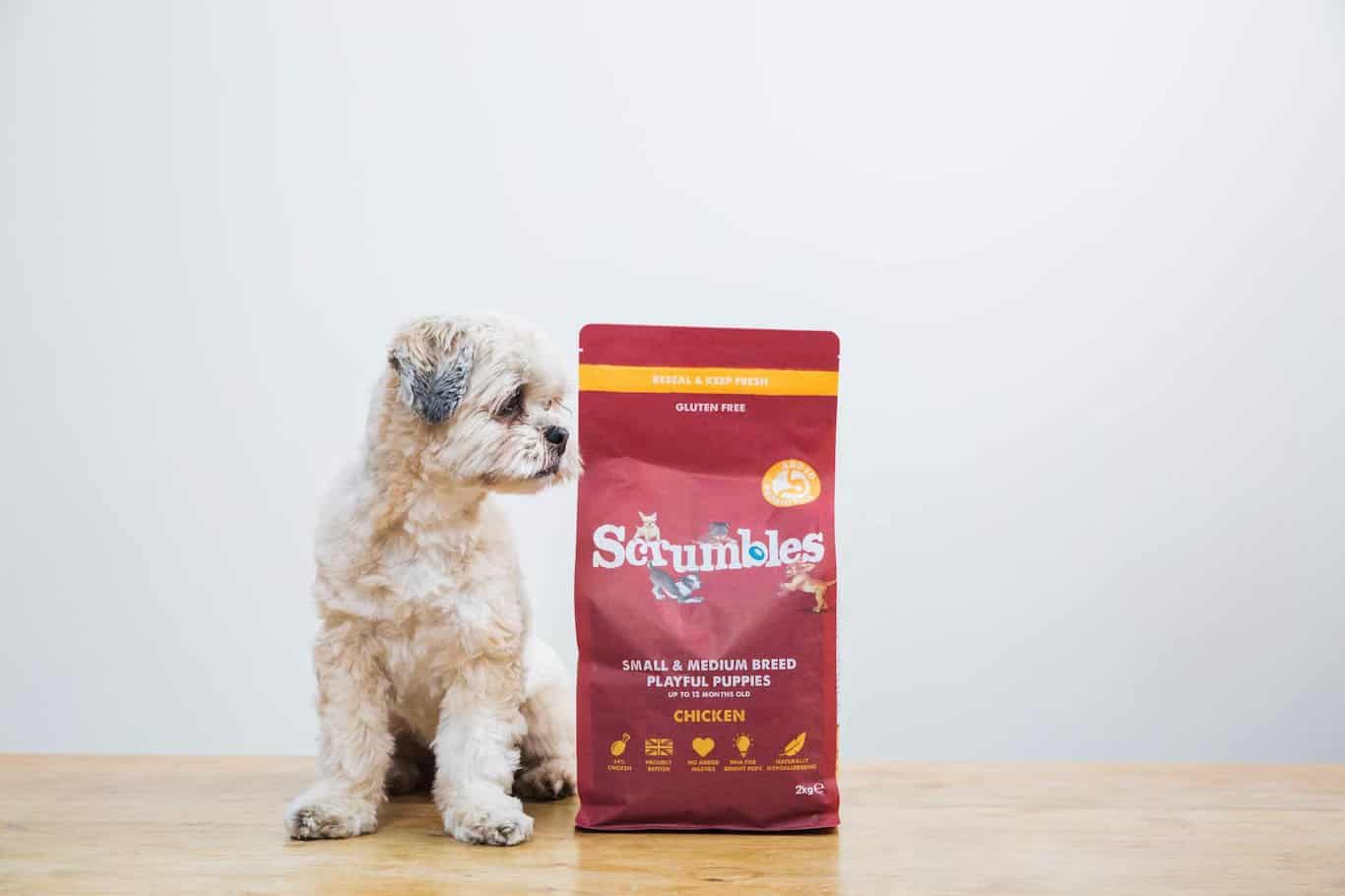It’s not just humans who have spent several decades eating our way to bad health. Our pets have too.
Aneisha Soobroyen spent several years trying to cure her cat’s smelly poos (yep really). It lead her to study feline and canine nutrition, she then undertook 18 months (and many more poo investigations) testing pet food recipes on her cat and dog before launching Scrumbles. It’s a gut friendly, hypoallergenic pet food that is all natural with zero nasties.
Soobroyen is committed to selling natural pet food that isn’t just good for your pet but also doesn’t harm the planet. We sit down with her and her pets to find out how she’s done it

What experience did you have before starting a pet food brand?
Aneisha Soobroyen: I’ve always had a love for animals and knew I’d like to work with them in some way. Leaving university my first job was in pet food so that really cemented it for me. There was no single eureka moment; more a growing sense, whilst learning the industry from the inside out, that food for cats and dogs should be better and I could do something about it. Eventually, I convinced my husband, Jack, to join me and we took the leap together.
What do you wish people knew about mainstream dog and cat food?
AS: I wish people relied less on assumptions and turned their pet food packaging around and read the labels.
There are some great pet foods out there but some bloody awful products too. A pretty picture, familiar name and appealing description on the front of pack is not a guarantee of anything – shoppers have to find out for themselves.
If I were to advise anybody looking at ethical pet food to look for anything in particular, I’d give them the following guidance:
• Find the composition on the pack this is where brands legally list all ingredients by weight. If it’s not there, that’s a big issue.
• The first ingredient should be a named animal protein e.g. chicken, turkey, salmon etc. This is where your pet sources most of the amino acids they require.
• Cats are obligate carnivores (and to some in the scientific community dogs are too), meaning they need meat, so the meat content in cat food should be high. Look out for masked non-meat proteins like pea or potato protein, which are more difficult to digest and doesn’t offer all amino acids.
• The animal protein should be clearly named, i.e. it should be from a particular animal like chicken, turkey, salmon etc. If a pack is labelled meat, meat derivatives, animal fat or any similar generic term it means the manufacturer isn’t telling you which animal that product is coming from and legally this means the formulation may differ batch to batch (I find that deeply concerning).
• You are likely to find a source of carbohydrate and fibre, be it rice, potato, sweet potato etc. Watch out for ingredient splitting like a brand calling out wheat, then wheat flour, then wheat bran. This is a way of dividing an ingredient up to make it seem like there is less in there than there really is.
• Hopefully this will change but currently you don’t need to declare the exact % inclusion of ingredients, simply the order they come in so a recipe could say 40% chicken and then have potato listed next which could actually account for 39%. We think it’s important to know exactly what you’re feeding so we fully declare our ingredient breakdown.
• Finally, look out for artificial additives or preservatives, these are worth avoiding and even added salt or sugar as they simply aren’t necessary and too much can have a negative impact on your pet’s health.

“I wish people relied less on assumptions and turned their pet food packaging around and read the labels”
Separately to the ingredients, not all pet foods are made equally.
Two foods with the same make up could be processed in different ways impacting the digestibility. There are many ways to prepare or cook a pet food and within each type various levels of processing and temperature variance. Where possible, check if the brand of pet food will share how they process the food and if it’s not anywhere visible ask and I’d expect most ethical brands to share this.
Ultimately, it’s easy to get caught up in cold pressed or freeze-dried vs extruded or dehydrated etc but I’d encourage shoppers to pay the most attention to what is actually in the food and where possible shop locally as there are lots of good foods available in the UK.
How is yours made?
AS: Of course, it all starts with the ingredients. We source quality ingredients, (eg. free run chicken) and source mostly from the UK. This isn’t always possible so some ingredients like our rice comes from further afield.
Once prepared and weighed, our ingredients are mixed before the cooking process. We use a process called freshtrusion, which is a version of extrusion that uses lower temperatures and allows the use of fresh ingredients – this delivers a highly digestible food which contains more nutrients. We’re careful to cook at a low temperature, that’s high enough to kill any harmful bacteria, for up to 90 seconds. Once cooked, our food is cooled before we add our probiotic to promote gut health before packing into bags and sending to our lovely customers.

Why was it important for Scrumbles to make everything in the UK?
AS: We’re a British independent pet food brand and love to support other British businesses. But more than that we’re conscious about being kind to Mother Earth and minimising our carbon footprint. The lower price of manufacturing abroad is tempting but we made a commitment from the get-go that we would do things differently and do things better so manufacturing in the UK is a non-negotiable.
On the foodie side, manufacturing locally and sourcing ingredients locally means the produce is fresher when it gets to your pets’ bowl and we think that makes for a more delicious meal.
“The pet food industry is long-established and it’s up to brands like Scrumbles to challenge the status quo to push ethical matters forwards”
Does organic and ethical food really make a difference to your cat or dog?
AS: In recent years pet owners are becoming more conscious in their shopping habits and understand that their purchases have an impact on the wider community. People argue over the health benefits of organic produce, but most will agree it’s better for the environment.
The difficulty in natural pet food is the complexity of the accreditation. Simply using organic ingredients doesn’t make you eligible to call your product organic since there are strict rules around sharing production facilities with non-organic products. Unless you own your own factory or are prepared to ship across from overseas this can be almost impossible to achieve.
Ethical is a broad term but we believe that brands have a duty to operate more ethically. The pet food industry is long-established and it’s up to brands like Scrumbles to challenge the status quo to push ethical matters forwards. Whether that be a social issue like supporting more women in the industry, or an environmental issue, like reducing the use of non-recyclable packaging.

Does pet food need to be hypoallergenic?
AS: Hypoallergenic is a problematic term as it is so open to interpretation. Simply put it means relatively unlikely to cause an allergic reaction but of course that would depend on what you (or your pet) are allergic to. At Scrumbles, our natural pet food is made from just a handful of ingredients, and we are very careful about what goes in and what doesn’t go into our food. So, when we use the term hypoallergenic, we are indicating that our food is formulated without many common allergens like beef, dairy, soy, gluten, pork, wheat and eggs. When shoppers are assessing food labelled as hypoallergenic, I’d encourage them to still look at the food’s composition and look out for anything they know their pet has any issue with since a food labelled hypoallergenic could still contain an ingredient that doesn’t suit their furry friend.
Do you think more people think about the impact of pet food on the planet or on their pet?
AS: Sadly, not as much as I’d like. If you ask any animal lover, I’m sure they’d say they want the best for their pets but unfortunately, they don’t always make the connection between the quality of food and the resulting quality of life. Marketing also plays a role. The leading brands have bigger budgets to get in front of people and will often earn trust from paid celebrity ambassadorship distracting people from what matters, the ingredient list. We have a lot of conversations with people about poo and a lot of people are surprised when they find out what their cat’s or dog’s poos have been trying to tell them.

“The difficulty in natural pet food is the complexity of the accreditation. Simply using organic ingredients doesn’t make you eligible to call your product organic…”
How are you combating the impact of your packaging and delivery?
AS: Working with food is really tricky as plastic plays such a useful role in keeping food fresh and protecting it from contamination. We’ve trialled a lot of packaging and environmentally friendly options have different compromises. E.g. with compostable packaging, with no moisture barrier it doesn’t respond well to high meat levels, can cause the food to go rancid and has a shorter shelf life than the food itself. A lot of the recyclable materials need to be recycled at specific recycling points and not all local councils collect for these, so the onus is on brands to educate shoppers and ultimately on shoppers to dispose of packaging in the right way.
As our foods have high meat content, we’ve moved to recyclable packaging which will feed through this year. We’ve spent a long time developing our wet pet food and to find a suitable recyclable solution has been difficult – it’s important to us to manufacture in the UK but British factories aren’t always equipped to deal with recyclable packaging which is why other brands have chosen to manufacture their wet food abroad. We’ve had to compromise on the size of our tin in order to ensure we’re not manufacturing abroad.
There are other things that we’ve been working on to ensure we’re providing a responsible, eco-friendly pet food and 2019 will see us introduce some zero plastic products by going back to some old-school technology. We use DPD who are carbon neutral or in London we offer delivery by bike.
Scrumbles works with a lot of charities, can you tell us about that?
AS: So far, we’ve worked with 16 different charities in one form or another, for example we feed the feral cats of the charity Dogs on the Street, as well as the dogs. Many have come about from meeting charities at the various pet events we attend or coming across their stories on social media. As we are small, we try and help where we can have an impact; be that through providing food or even a day’s work. We recently had the pleasure of ground keeping at a local RSPCA centre. We love to help hedgehog charities; they’ve had such a tough time this year with the hot summer and they’re always in need of a high protein food.
Last but not least, tell us about your pets Boo and Smudge (see them on the side of Scrumbles packaging). How have they changed your life?
AS: Boo is our ferocious feline who we rescued as a stray kitty. She’s independent and apprehensive of strangers but cuddly around us and loves to sleep on our heads and shower us with kisses. She’s best friends with Smudge our very docile dog who we’ve had for nine years. Smudge is loving, affectionate and loves to chase squirrels. I honestly couldn’t imagine life without them.
Having two loving pets is good for mind, body and soul. They bring companionship and laughs aplenty. Watching them grow, learn and play is so fulfilling, and whilst we may not be able to speak directly with them there is real sense of dialogue and kinship. We’ve got a local dog owners’ group in our area that we started a few weeks ago and it’s brought us a great sense of community.
Find out more about Scrumbles here.










